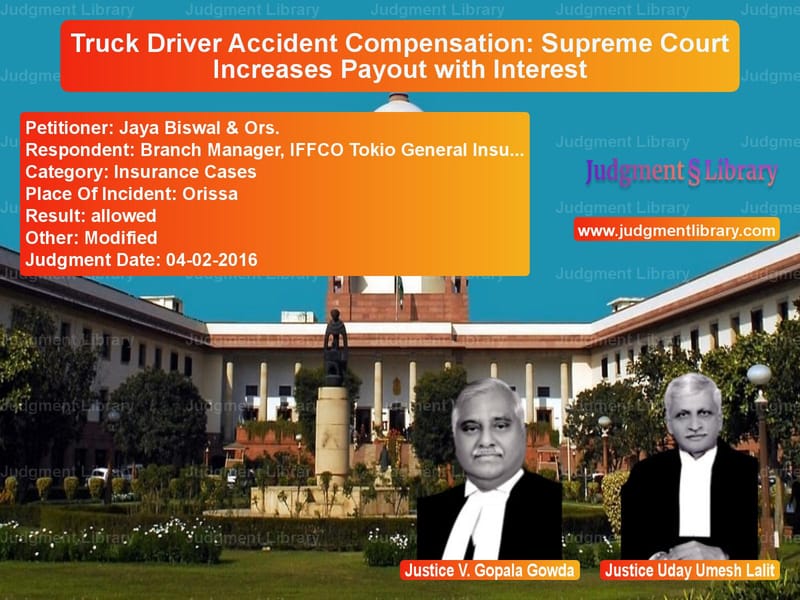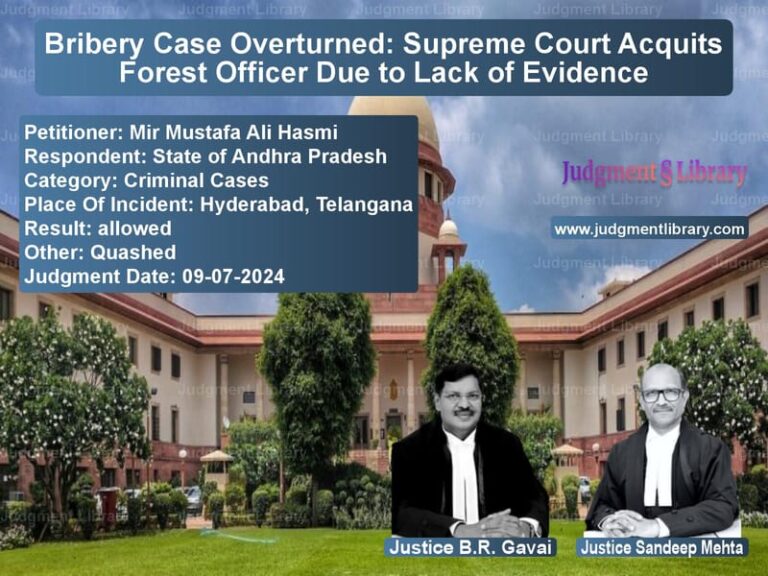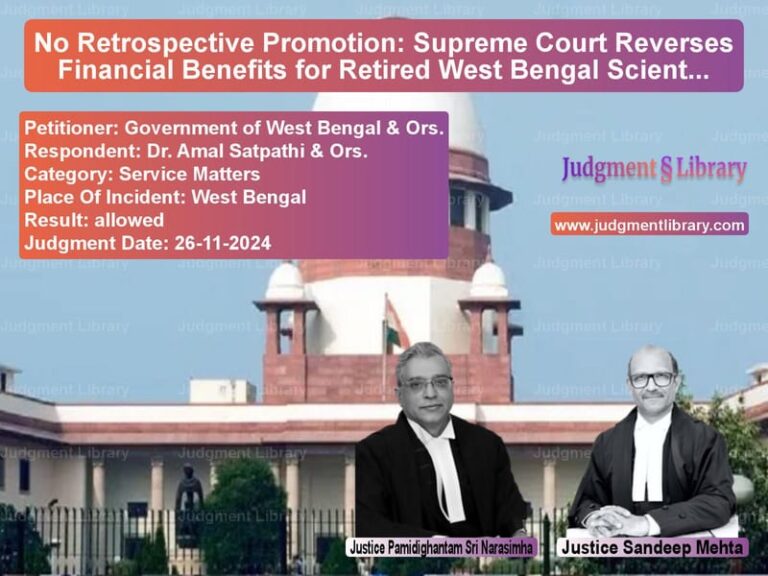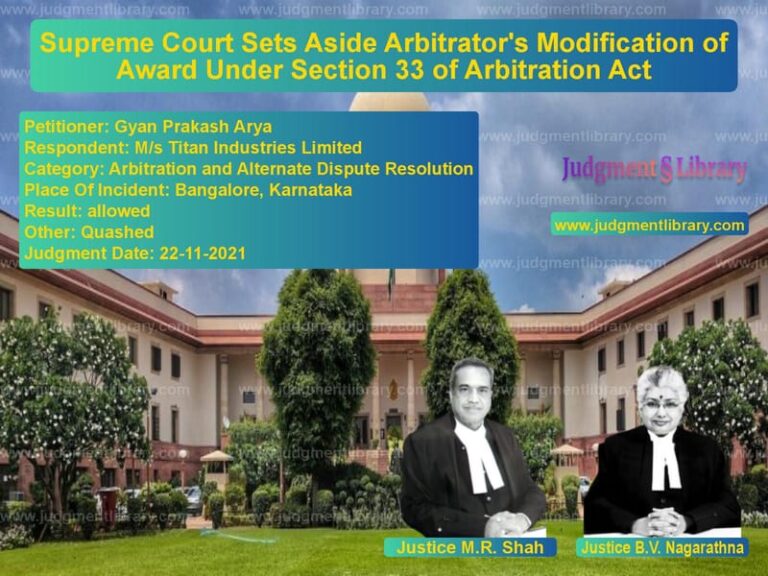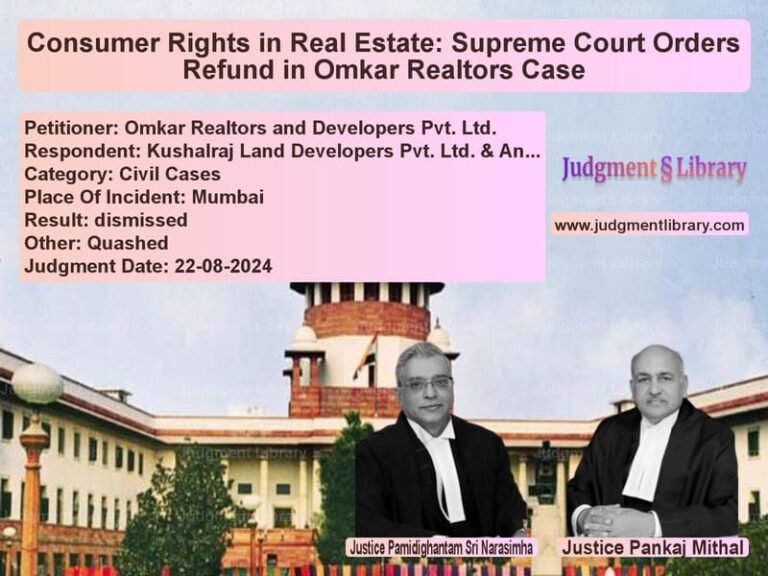Truck Driver Accident Compensation: Supreme Court Increases Payout with Interest
The case of Jaya Biswal & Ors. vs. Branch Manager, IFFCO Tokio General Insurance Co. Ltd. & Anr. revolves around the compensation claim filed by the family of a deceased truck driver under the Employees’ Compensation Act, 1923. The Supreme Court ruled on whether the High Court was justified in reducing the compensation awarded by the Workmen’s Compensation Commissioner.
Background of the Case
The deceased, the elder son of the appellants, was employed as a truck driver by respondent no. 2, Bikram Keshari Patnaik. On July 19, 2011, while delivering wheat bags from Berhampur, Orissa, to Paralakhemundi, Andhra Pradesh, he sustained severe head injuries in an accident and died on the spot.
The truck cleaner informed the police at Mandasa Police Station, Srikakulam, who conducted an inquest, prepared a panchnama, and sent the body for post-mortem. The family was then notified and cremated the deceased in their native village.
On November 3, 2011, the appellants—father, mother, and younger brother of the deceased—filed W.C. Case No. 61 of 2011 before the Commissioner for Workmen’s Compensation, Ganjam District, Berhampur. Their claims included:
- The deceased was earning Rs. 13,000 per month, including salary, daily allowance, and trip benefits.
- They sought Rs. 18,00,000 as compensation for lost earnings.
- They demanded additional amounts for funeral expenses, mental agony, loss of estate, and inconvenience.
Employer’s and Insurance Company’s Response
The truck owner, respondent no. 2, filed a written statement, arguing:
- The deceased died due to his own negligence while trying to enter the moving vehicle.
- The employer was not liable as the driver was not on official duty when the accident occurred.
- The deceased was paid only Rs. 100 per day and Rs. 50 as a daily allowance.
The Workmen’s Compensation Commissioner, however, rejected these defenses.
Commissioner’s Ruling
Based on testimony and documents, the Commissioner concluded:
- The deceased was employed by respondent no. 2 and was on duty when the accident happened.
- His age was 27 years as per his driver’s license.
- His actual salary was Rs. 4,000 per month, plus Rs. 6,000 daily allowance, and Rs. 3,000 trip benefits.
- The compensation amount was calculated as:
Rs. 8,000 (statutory wage limit) × 50% × 213.57 (factor for 27 years) = Rs. 8,54,280
The Commissioner also awarded:
- 12% annual interest from the accident date.
- Rs. 20,000 as legal costs.
- Total compensation of Rs. 10,75,253.
High Court Appeal and Reduction in Compensation
The insurance company appealed to the Orissa High Court under Section 30 of the Employees’ Compensation Act.
The High Court reduced the compensation to Rs. 6,00,000, stating:
- The Commissioner’s method of calculating the deceased’s wages was incorrect.
- The penalty and 12% interest awarded were not justified.
- Final compensation was fixed at Rs. 6,00,000 with no penalty or interest.
Supreme Court’s Judgment
The appellants challenged the High Court’s decision before the Supreme Court, arguing:
- The High Court had no jurisdiction under Section 30 of the Employees’ Compensation Act since no substantial question of law was involved.
- The deceased’s family was entitled to full compensation and interest.
- The High Court’s order was arbitrary and lacked justification.
The Supreme Court, comprising Justice V. Gopala Gowda and Justice Uday Umesh Lalit, ruled in favor of the appellants, stating:
- The High Court erred in reducing the compensation without a legal basis.
- The deceased was engaged in employment at the time of his death, making the employer and insurer liable.
- The insurance company must pay the full compensation awarded by the Commissioner.
The final compensation was calculated as:
Rs. 10,000 × 50% × 213.57 (factor for 27 years) = Rs. 10,67,850
Additional amounts:
- Funeral expenses: Rs. 25,000
- Total Compensation: Rs. 10,92,850
- Interest: 12% per annum from July 19, 2011
- Legal costs: Rs. 25,000
The Court ordered the insurance company to deposit the amount with the Employees’ Compensation Commissioner within six weeks for distribution to the appellants.
Key Legal Takeaways
- Compensation for Work-Related Death: Families of workers who die during employment are entitled to compensation under the Employees’ Compensation Act.
- High Court’s Limited Jurisdiction: The High Court can only intervene in workmen’s compensation cases if there is a substantial question of law.
- Employers’ Liability: An employer cannot evade liability by claiming the worker was negligent.
- Insurance Company’s Obligation: The insurer must pay compensation in full if the employer is found liable.
Conclusion
The Supreme Court’s ruling ensures justice for workers’ families and upholds the purpose of the Employees’ Compensation Act. The decision prevents arbitrary reductions in compensation and reinforces the financial security of dependents of deceased workers.
Don’t miss out on the full details! Download the complete judgment in PDF format below and gain valuable insights instantly!
Download Judgment: Jaya Biswal & Ors. vs Branch Manager, IFFC Supreme Court of India Judgment Dated 04-02-2016-1741852462435.pdf
Direct Downlaod Judgment: Direct downlaod this Judgment
See all petitions in Life Insurance Claims
See all petitions in Compensation Disputes
See all petitions in Insurance Settlements
See all petitions in Judgment by V. Gopala Gowda
See all petitions in Judgment by Uday Umesh Lalit
See all petitions in allowed
See all petitions in Modified
See all petitions in supreme court of India judgments February 2016
See all petitions in 2016 judgments
See all posts in Insurance Cases Category
See all allowed petitions in Insurance Cases Category
See all Dismissed petitions in Insurance Cases Category
See all partially allowed petitions in Insurance Cases Category

